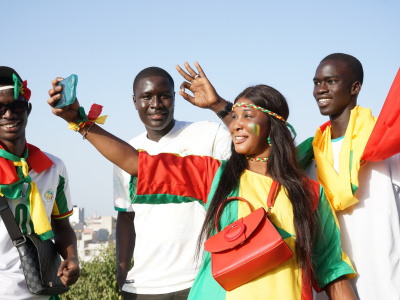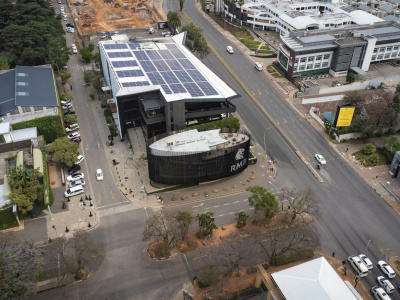
The democratic renaissance of Senegal: A beacon for the region and beyond
In a joint commentary with Latyr Tine from the Gorée Institute, Sara Gianesello looks at the recent elections in Senegal. In a global context where democracy is increasingly backsliding, Senegal is the beacon of hope from which the region and the whole continent can learn.
The election of the 44-year-old Bassirou Diomaye Faye marked a new era in Senegal’s recent political history. After being sworn-in on 2 April, he formed a government promising ambitious changes. In a global context where democracy is increasingly backsliding, Senegal is the beacon of hope from which the region and the whole continent can learn.
Initial reports about the elections were not so promising. Months of political turmoil began in February when former president Macky Sall unilaterally postponed the elections on the pretext of institutional discord between the national assembly and the Constitutional Council. Sall's decision lacked legal basis, violating the Senegalese Constitution and international treaties, including the ECOWAS Protocol on Democracy and Good Governance. His move, taken abruptly and without any valid reason, was widely criticised as an attempted unconstitutional change of government (UCG) ‘by other means’ – i.e., when the constitution is abrogated, suspended, or significantly amended – and catapulted the country into uncertainty.
Already during his 12-year term, Sall showed anti-democratic behaviour and limited Senegal’s civic space. His rule was characterised by a clientelistic and repressive leash, using the justice system for his own political ends and to suppress critical voices. He imposed repeated bans on demonstrations and incarcerated more than 1062 political prisoners, including Faye, and other activists and journalists.
Senegal’s democracy holds its ground
In a global context where democracy is increasingly backsliding and where major election results do not necessarily result in a full transfer of power, Senegalese people were able to put the democratic governance trajectory of their country back on track through the ballot box. This was possible because both the Senegalese democratic institutions and civil society held their ground and acted swiftly to counter Sall’s attempt to subvert the electoral system.
The Constitutional Council overturned the postponement of the election, ruling that the decision of the former president Sall was unconstitutional and that the elections should take place ‘as soon as possible’. This decision reasserted Senegal’s judicial independence and protected the country’s democracy. Civil society groups, backed by young protesters, religious leaders, women and academics, forged an alliance – Aar Sunu Election (Protect our election) – with opposition parties and called on citizens to ‘mobilise en masse’ throughout the country and in the diaspora against the postponement.
Senegal also received strong support from democracies abroad, including the EU, France, Germany and the US. ECOWAS also reacted quickly to Sall’s decision to postpone the elections, urging Senegal to restore the electoral calendar and sending a diplomatic mission to address the political situation. The African Union expressed its concerns after Sall’s decision.
Senegal, a beacon in a region of rising democratic recession… but not ready to be too progressive
The country is traditionally considered a stable democracy in a region with coups ‘stretching from the Atlantic to the Mediterranean’. The election of Bassirou Diomaye Faye, who was previously unknown to the public as he had been working as a tax official and in the shadow of PASTEF opposition party leader Ousmane Sonko, now prime minister of Senegal, happened in an open, calm and transparent process. Faye stood in Sonko’s stead when the latter became ineligible following a criminal conviction, and the PASTEF political party was dissolved by the Senegalese authorities.
President Faye presents himself as anti-establishment. His ticket won on promises to break with the past through the fight against corruption, the strengthening of national sovereignty and the reform of the economy and justice system. The backing he received from civil society and activists, young people, religious leaders, women, and the diaspora signals the willingness of the population to break with the past political status quo and push for structural change.
In particular, the population felt they did not necessarily reap the benefits of the exponential economic growth that Senegal has been experiencing. Senegal grapples with soaring youth unemployment rates – more than 60% of Senegal's population of 18 million are under the age of 25, of which 20% is unemployed – and high cost of living that are pushing many young Senegalese to attempt to reach Europe through the Atlantic route.
President Faye was elected in the first round with 54,3% of votes. The only female presidential candidate, Anta Babacar Ngom (a business executive who runs her family’s food company), gained less than 1% of the votes, showing that the country is not yet ready for a woman to hold such a high-level power position. However, her presence alone in the electoral campaign was key to raise awareness on gender equality. At only 40 years old, Ngom emerged as an advocate for both women and youth. Many other female candidates were disqualified in the sponsorship stage, which requires more than 40,000 signatures to pass.
Senegal has set the example for other African countries: even in the face of manipulation attempts, the people can rise up and effect change, without having coup leaders or the military speak for them.
Lessons for the the region and wider continent
Africa has a busy electoral calendar in 2024, with 19 countries holding presidential or general elections. In particular, a number of Sahelian countries that have suffered coups d'état in recent years are expected to hold elections this year as part of an agreed timetable for a return to civilian rule. When and how these elections take place will determine the trajectory of democracy and governance in the region. Senegal has set the example for other African countries: even in the face of manipulation attempts, the people can rise up and effect change, without having coup leaders or the military speak for them.
Some lessons can be drawn from the recent Senegalese experience:
-
Africa needs strong, independent institutions: The decision of the Constitutional Council to reject the president's decree postponing the presidential election safeguarded the democratic basis of the country. In an era where the rule of law is greatly declining, the need to protect and strengthen such institutions is greater than ever.
-
African civil society is an invaluable force for change: Senegalese civil society proved to be a key actor in exerting pressure on the state to respect the constitution and the electoral calendar, demonstrating the importance of having such an actor to serve as a watchdog of institutions to uphold democratic values. Civil society groups in Senegal can now leverage the newly created alliance to make sure that government reforms aimed at preventing democratic erosion are implemented.
-
No need to resort to coups d'état to bring about change: Despite Sall’s increasingly anti-democratic behaviour, the Senegalese people have never called on the army to take power, and the army displayed professionalism by not seizing power as others had done in similar circumstances. It was by voting that change happened, without bloodshed and in compliance with democratic and institutional standards.
-
African youth can be a ‘force for proposals’ and not just a ‘force for protest’: The PASTEF political party is made up of young executives from the Senegalese public administration, civil society and the diaspora who understand the needs of their peers and therefore put forward proposals to meet these needs. The party (and the president), however, will need to deliver on its promises to ensure that the democratic (and economic) dividends are enjoyed by the young population.
-
ECOWAS, the AU and the EU need to rethink their approach to UCGs by constitutional manipulation: Following the coups d'états that swept through the region, the international community appeared disoriented. The case of Senegal shows that a vibrant civil society is key to preventing the erosion of democracy. The international community needs to strengthen their support to CSOs to prevent the shrinking of civil space and combat the occurrence of coups.
The views are those of the author and not necessarily those of ECDPM.





